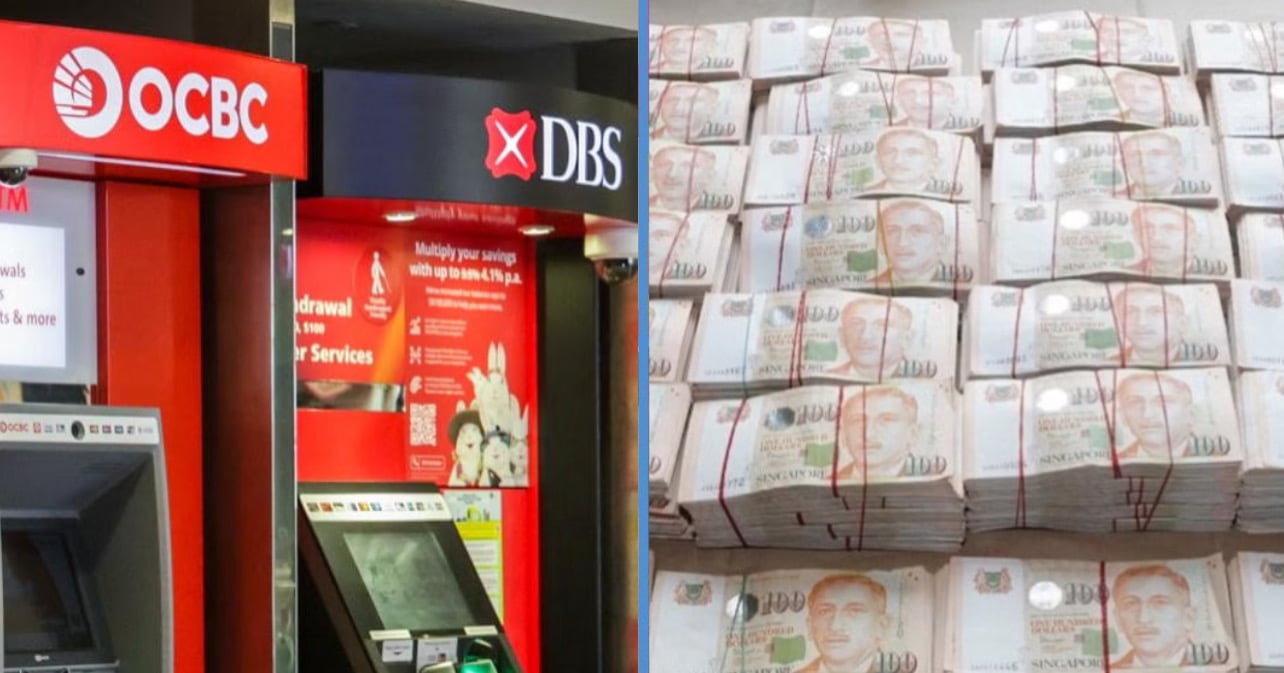Hearings for the ten foreigners involved in the $1 billion money laundering saga resumed this week. And you can bet your bottom dollar that juicy details have been revealed over the course of the hearings.
DBS and OCBC were listed as creditors to companies linked with the accused persons in the money laundering saga.
Here’s everything you need to know.
DBS & OCBC Listed as Creditors to Companies Linked with $1 Billion Money Laundering Saga
If you’ve yet to hear of the $1 billion money laundering saga, you can watch this video to find out more:
Ten foreigners were charged earlier this month for suspected involvement in multiple offences, including money laundering, forgery and resisting arrest.
Last Wednesday (23 August), the accused persons had their first court hearing, where all sorts of claims were made, including allegations of illegal detention.
You can read more about the first court hearing here.
As hearings resume this week, Singaporeans were surprised by news of large banks like DBS and OCBC’s involvement in the saga.
TLDR: There are several investment companies linked with the foreigners charged in the $1 billion money laundering saga. Multiple banks and financial institutions, including DBS and OCBC, were found to be creditors to these companies.
DBS: Four Charges Registered to Investment Company Linked to Su Haijin
The first on the court’s hit list is the investment company Aiqinhai Investment, where one of the accused persons, Su Haijin, is the sole shareholder and director.
In case you need a refresher, Su Haijin was the one who jumped off his balcony during the police raid and landed himself in the hospital.
DBS? Embroiled in the business of someone like that? Damn.
Anyway, it was found that DBS had registered four charges to Aiqinhai Investment in August 2021. Simply put, charges are akin to the cost of borrowing, paid by borrowers, in this case, Aiqinhai Investment, to lenders like DBS.
This makes DBS a creditor to Aiqinhai Investment.
Uh oh. We don’t think the Monetary Authority of Singapore (MAS) will be pleased.
OCBC: One Charge Registered to Investment Company Linked to Su Baolin
The next investment company on the court’s hit list is Xinbao Investment Holdings, where one of the accused persons, Su Baolin, is a director.
In January 2022, a charge was registered by the Bank of Singapore, the private banking arm of OCBC, to Xinbao Investment Holdings. This makes OCBC a creditor to Xinbao Investment Holdings.
From this to the banking service outage yesterday (29 August), optics for OCBC don’t seem great at the moment.
Standard Chartered Allegedly Cheated by Fake Documents from Accused Persons; Other Financial Institutions Also Linked
Yet, DBS and OCBC aren’t the only financial institutions embroiled in the $1 billion money laundering saga.
Apparently, Su Baolin also attempted to cheat Standard Chartered Bank with fake documents.
We’ll give credit where it’s due: this Su Baolin guy is decently ambitious.
A laundry list of other financial institutions was also revealed to be linked to the accused persons in the saga. This includes Malaysia’s CIMB Bank, Citigroup’s local subsidiary and Deutsche Bank.
The question is: Where’s UOB on the list? Do criminals hate UOB or something?
Be it local banks or international banks, they’re all knee-deep in the trenches now. Even local property agents, precious metals dealers and golf clubs have also found themselves embroiled in the saga.
At this juncture of the court hearings, the prosecution is seeking documents from more than ten financial institutions linked to accused persons in the money laundering saga.
Yes, you read that right. More than ten; your bank could be one of them.
To make things worse, the size of the banks’ exposure has yet to be clarified, although filings have stated that DBS and OCBC’s facilities are secured against “all monies” at the companies.
The rest of the banks involved in the saga? We don’t know for sure.
If it makes you feel any better, MAS has stated that it will take “firm action” against financial institutions that breached anti-money laundering regulations. MAS is also currently undertaking supervisory engagements with these banks.
RIP to MAS staff—you already know they’re all OT-ing the coming weeks and months.
In any event, Singapore has also been taking steps to curb illicit flows into Singapore.
Huh? Gong simi?
Essentially, taking steps to ensure money from sus sources doesn’t find its way into our financial system, such as in the current case lor.
One of these measures includes the passing of the Financial Services and Markets (Amendment) Bill, which permits banks in Singapore to share information about potentially risky clients.
It’s not hard to understand: the same way you share gossip in the office about Ah Seng because he bo zuo gang, the banks share information about risky clients they shouldn’t engage in transactions with.
Of course, there are also the standard controls required of banks. This includes conducting know-your-client (KYC) procedures, regular account reviews, and monitoring and reporting suspicious transactions.
Financial institutions that fail to comply with these regulations can be subject to fines of up to $1 million for each offence.
Not so heng ong huat.
But why are these controls so important?
As Singapore continues rising the ranks as one of the top financial and wealth hubs globally, we must have adequate controls in place to ensure money flowing through Singapore isn’t sus.
This is especially true given the recent scandals Singapore has been involved with. Remember Malaysia’s 1Malaysia Development Berhad (1MDB) scandal? Local financial institutions were involved in that as well.
So, what’s your take? Do you think adequate controls are in place to ensure there won’t be a repeat of the 1MDB or this $1 billion money laundering saga?





